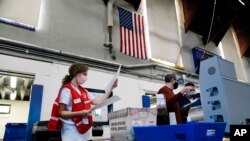Long after a contentious U.S. presidential election that unleashed a torrent of partisan threats against poll workers and others, many American election officials continue to feel unsafe because of their jobs, according to a recent survey.
The survey, commissioned by the left-leaning Brennan Center for Justice, found that one in three officials felt unsafe while one in six reported receiving work-related threats.
Last week in a speech on voting rights, Attorney General Merrick Garland highlighted the growing threat against election administrators and workers and vowed that the Justice Department would prosecute any violations of federal law.
"We have not been blind to the dramatic increase in menacing and violent threats against all manner of state and local election workers, ranging from the highest administrators to volunteer poll workers," he said. "Such threats undermine our electoral process and violate a myriad of federal laws."
Many of the election officials surveyed blamed false information spread by social media for their problems — much of it making baseless claims of widespread voting fraud. According to the study, 78% of officials said social media made their jobs “more difficult,” while 54% percent said they believed social media made their job “more dangerous.”
Trump blamed
Many officials blamed former President Donald Trump for inspiring the threats by falsely claiming the November election had been rigged against him in favor of his Democratic opponent, Joe Biden.
However, Brennan Center analysts said the problem runs “far deeper than one man.” They cited recent efforts by dozens of state officials and legislators across the country to undermine election officials and workers by passing new legislation and taking other actions to mitigate their influence.
Between January 1 and mid-May alone, at least 14 states enacted 22 new laws that will restrict access to the vote and weaken the hand of state and local election officials and poll workers to protect the integrity of the polls, according to the Brennan Center.
“It is no accident in 2021, as American democracy finds itself under assault, these officials are a prime target,” the Brennan Center said in its report. “If we are going to protect American democracy, we must protect them. It is no exaggeration to say the survival of our democracy depends on it.”
Many Republicans said they passed the legislation to bolster Americans’ confidence in the voting process and the accuracy of the voting rolls. They said they were also seeking to strengthen the authority of partisan poll watchers to make sure ballots are properly handled.
Arizona recount
Arizona state Senate Republicans ordered an unofficial hand-count audit of the 2020 presidential election results in Maricopa County in search of evidence of fraud, prompting Republican officials in other states to consider emulating the process in the future.
Hans von Spakovsky, a senior legal fellow with the conservative Heritage Foundation, said the new laws that have angered Democrats are in fact meant to “fix the vulnerabilities that exist in our election system.”
“They are not discriminatory and, contrary to [Garland’s] misrepresentations, protect the fairness and integrity of the election process for all voters,” Spakovsky said in an email.
The Brennan Center survey was based on interviews with 233 election officials across the country. It was conducted April 1-7 and had a margin of error of plus or minus 6.4%.
The November election saw an unprecedented level of threats against election workers and officials. The threats became so serious that several officials were forced to move out of their homes for their own safety. Among them were top Georgia officials including Secretary of State Brad Raffensperger, a Republican who defied Trump’s demand to deliver his state to the former president.
Those types of threats are unlikely to dissipate anytime soon, according to some experts. In May, Arizona Secretary of State Katie Hobbs, a Democrat, reported that a man called her office saying she deserved to die and inquiring what she was wearing “so she’ll be easy to get.”
"It was one of at least three such threats today,” Hobbs tweeted on May 6. “Then a man who I’ve never seen before chased me and my staffer outside of our office.” The governor subsequently assigned state troopers to provide Hobbs with around-the-clock protection.
Condemnation of threats, violence
The onslaught of threats has alarmed many in politics and government. In February, the National Association of Secretaries of State (NASS) passed a resolution condemning “violence and threats of violence against election workers" and calling "on all leaders to denounce these dangerous occurrences.”
Asked for comment on the Brennan Center report, NASS referred VOA to the resolution.
The Brennan Center called on the Justice Department to set up a task force to prioritize identifying, investigating and prosecuting those threatening election workers. The center also urged states to coordinate investigating and prosecuting those responsible for threatening election officials.
“As states around the country pass laws that will limit access to voting in the name of baseless ‘election integrity concerns,’ they have almost entirely ignored one of the most pernicious threats to our democracy in decades: the harassment and intimidation of election workers,” the report said.
A Justice Department spokesperson did not respond to a request for comment on the Brennan Center report and its proposal for an election threats task force.
Sylvia Albert, director of elections and voting for Common Cause, a government watchdog group based in Washington, said the persistent threats would make it harder to fill the slots ahead of the 2022 midterm elections.
“And it is the American people who will suffer when elections are unable to be run in a safe, free and fair way with adequate staffing,” Albert said.







